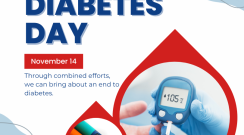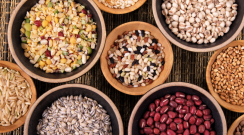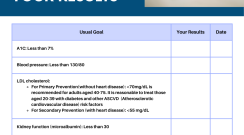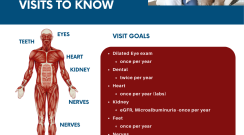يعد دليل مرض السكري ٣٦٠ المصدر النهائي للأفراد الذين يبحثون عن فهم شامل لمرض السكري واستراتيجيات الإدارة الاستباقية. من خلال أحدث المعلومات والنصائح العملية، يهدف هذا الدليل إلى تزويدك بالمعرفة والاستراتيجيات لتحسين إدارة مرض السكري لديك، وتحسين رفاهيتك بشكل عام، والعيش فى حياة مُرضية
يوفر هذا الدليل ثروة من المعلومات التي تغطي جوانب مختلفة من مرض السكري، بما في ذلك أنواع مرض السكري المختلفة ، والأعراض الشائعة ، وعوامل الخطر، والمضاعفات. كما يخوض الدليل في أهمية التغذية السليمة وممارسة الرياضة والأدوية في التحكم بمستويات السكر في الدم
بالإضافة إلى ذلك، يقدم الدليل رؤى حول تقنيات المراقبة، بما في ذلك أجهزة مراقبة الجلوكوز وإرشادات الفحص. كما يوفر معلومات متعمقة حول إدارة الأنسولين. يتناول الدليل الجوانب النفسية والعاطفية للعيش مع مرض السكري، مع التشديد على أهمية شبكات الدعم وآليات التأقلم
علاوة على ذلك، فهو يغطي الاحتياطات والإرشادات المحددة التي يجب اتباعها عند إدارة مرض السكري أثناء المرض والتعديلات الضرورية على نظام الدواء أو الأنسولين. يقدم الدليل رؤى حول كيفية الاستفادة القصوى من مواعيدك مع أخصائيي الرعاية الصحية وكيفية التواصل الفعال باحتياجاتك ومخاوفك. ويقدم إرشادات متخصصة حول إدارة مرض السكري في سن 65 وما فوق ، بالإضافة إلى معلومات للأفراد الذين يعانون من مرض السكري أثناء الحمل، بما في ذلك الاعتبارات الغذائية، ومراقبة مستويات السكر في الدم، والمضاعفات المحتملة
يتضمن الدليل قسمًا شاملًا حول الإجراءات الوقائية، مما يمكّن القراء من المعرفة حول الوقاية من الإصابة بالسكري وإدارة الحالة بشكل فعال لمنع المضاعفات. يهدف إلى تزويد مرضى السكري بالأدوات التي يحتاجونها لاتخاذ قرارات مستنيرة بشأن صحتهم والسيطرة على مرض السكري
يسلط دليل السكري 360 أيضًا الضوء على أهمية موارد تعليم إدارة مرض السكري بنفسك وشبكات الدعم المتاحة لتمكينك من إدارة مرض السكري بشكل فعال لتلبية الاحتياجات المتنوعة للأفراد المصابين بالسكري، يناقش الدليل التطورات في تكنولوجيا السكري، مثل أنظمة مراقبة الجلوكوز المستمرة ومضخات الأنسولين وغيرها من الأدوات المبتكرة التي يمكن أن تعزز إدارة مرض السكري لديك. توضيح فوائدها واستخدامها ودمجها المحتمل لهذه التقنيات في روتينك اليومي
نعتقد أن هذا الدليل سيكون أداة قيمة في رحلتك للتغلب على مرض السكري. لا تتردد في التواصل معنا إذا كان لديك أي أسئلة أخرى أو إذا كان هناك أي شيء آخر يمكننا مساعدتك فيه
:قائمة المحتويات
حول ديفا
التوعية بمرض السكري
تنظيم الوجبات الغذائية
النشاط البدني و ممارسة الرياضة
مراقبة نسبة الجلوكوز في الدم
حبوب السكري
الأنسولين والحقن الأخرى
التحكم فى ارتفاع أو هبوط نسبة الجلوكوز في الدم
قواعد العناية عند المرض
الحد من خطر حدوث المضاعفات
زيارات الرعاية الصحية و نتائج الفحوصات المعملية المهمة التي يجب معرفتها
مرض السكري و الصحة النفسية
دعم و تعليم " كيفية الإدارة الذاتية لمرض السكري" (DSMES)
التعايش مع مرض السكري
ادارة مرض السكري عند عمر ٦٥ عاما أو أكثر
الحمل
تكنولوجيا مرض السكري
















































